This issue of Phytogen is for our students. I hope you enjoy reading reports from students presenting posters at last years ASPS2019 at La Trobe University in Melbourne.
We also have an article by Hank Greenway about teaching critical thinking (Greenway Critical thinking….). The article was written by Hank Greenway, UWA, and reflects on his teaching strategies developed in the 1980s and that are relevant today.
This article draws attention to a Feature Essay to be included as part of Chapter 3 in Plants in Action.
The Essay gives a detailed explanation of the essay topic and Hank’s development of thought experiments.
Using thought experiments to strengthen critical thinking at Universities
by Assoc/Prof Hank Greenway
Honorary Research Fellow, School of Agriculture and Environment, The University of Western Australia.
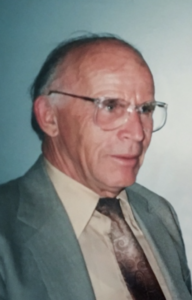
During the 1980s, I began using thought experiments in my courses on environmental plant biology to develop critical thinking in undergraduate students and young researchers. These thought experiments proved to be of great help to students and researchers in developing the rigour of their research and their ability to interrogate published information. They mastered the background material necessary to tackle the thought experiments, and they formulated and solved thought experiments, reinforcing their practice of the scientific method. The approach differs from that where the scientific method is described without involving logical reasoning and critical appraisal by students.
Briefly, thought experiments consist of:
1) Formulating the problem (enigma) and setting a hypothesis.
2) Designing an experiment(s) to solve the enigma.
3) Considering how far the suggested experiment(s) go towards solving the enigma and what new questions they raise.
An example is described in a featured-essay-in-Chapter-3-of-Plants-In-Action, co-authored with Jane Gibbs, David Turner and Brian Atwell. In our example, the essential background material is regulation of solute uptake and of cytoplasmic pH, subjects that are eminently suited to foster innovation and independent thought. These themes are relevant to how plants ‘manage’ in their physical and chemical environment. A similar approach is feasible in other disciplines.
A statement by Frank Carrigan, Macquarie Law School, that ‘…university teaching is there for people to take ownership of their learning’ seems so obvious. Yet it took me years at The University of Western Australia to find a design that motivated students and young researchers to become independent and skilled in critical thinking and debating their views. My specific purpose was to foster independence and engender confidence to test new ideas, with an emphasis on skills in practising the scientific method. In my experience, the approach outlined here and in detail in our featured-essay came closest to achieving this objective.
Student reports from La Trobe University ASPS2019
Bo Eng Cheong, PhD candidate, School of BioSciences, Faculty of Science, The University of Melbourne
I am Bo Eng Cheong, a final year PhD candidate from Professor Ute Roessner’s laboratory of School of BioSciences, the University of Melbourne. My PhD study focused on the understanding of cold acclimation response in Australian spring wheat cultivars upon cold stress (chilling, frost), by using metabolomics and lipidomics approaches. This study is also collaborated with Dr Rudy Dolferus from the CSIRO (Commonwealth Scientific and Industrial Research Organization) in Canberra.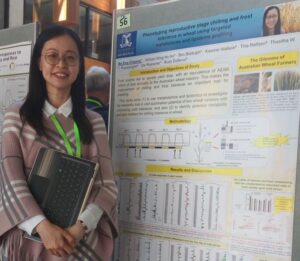
I became the member of Australian Society for Plant Scientist (ASPS) since 2016. I was excited to participate in the “ASPS 2019 Bringing Plant Science Together” conference to present my work via poster entitled “Phenotyping reproductive stage chilling and frost tolerance in wheat using targeted metabolome and lipidome profiling”. During the poster viewing session, I received so many positive feedback and comments from the audiences that come from different background such as academic field, industry, and research organization. I also gained many extra information about the wheat crop and the current situation of the crop production in Australia during the Grains Satellite meeting, which was held on the last day of the ASPS 2019 conference. All those invaluable comments and information I gained during the conference are very useful to further consolidate my study and helpful during my thesis writing.
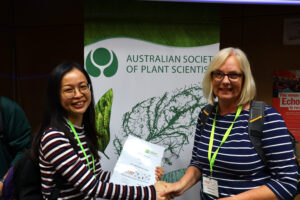
What makes me more excited is that when I was announced as the 1st prize winner for the ASPS Student Poster Competition. This is totally beyond my expectation! I was so touched and couldn’t hold back my tears when I received the award. Not only because I won the prize, but mainly because of my hard work get paid off and my study is recognized by people. Thank you so much ASPS 2019! Thank you so much to my beloved supervisors, collaborators and all the people that have helped me to make this study successful! ASPS 2019 will definitely become one of the sweetest journeys that I will cherish in my life!
Meridy Price, PhD student, School of Natural Sciences: Life Sciences, University of Tasmania
After finishing my honours project at University of Tasmania in 2019, I attended the ASPS 2019 conference at Latrobe University. This was my first conference I had attended, and I was thankful for the opportunity to present a poster on my honours research topic while I was there. My poster was based on my research into germination response to temperature in three native Australian forb species; Microseris walteri, Bulbine bulbosa, and Arthropodium fimbriatum and how local climate affects germination response curve and thermal germination niche in fragmented populations of these three species.
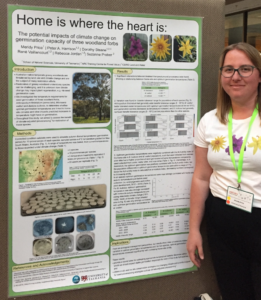
I was excited to take my findings to ASPS 2019 and share them with my fellow plant scientists and I received a lot of positive feedback and some great tips while I was there. This experience was my first time presenting my research to other academics and I was honoured to win second prize in the student poster competition.
I am truly grateful for the effort and expertise of the team that organised ASPS 2019, it was a terrific opportunity to listen to what other researchers are working on. I especially enjoyed Prof Jennie Brand-Miller’s talk on carbohydrate nutrition and Dr TJ Higgins’ discussion on how to educate people about GMOs. I started on my PhD not long after the conference ended (only a month later) and I hope to have some exciting results to share with the ASPS in the future.
Deepak Baranwal, Plant Breeding Institute, University of Sydney
I am Deepak Baranwal, a PhD candidate at the University of Sydney, Plant Breeding Institute. ACIAR John Allwright fellowship supports current PhD study. Aim of this study was to discover novel rust resistance genes/QTL in wheat. Evolution of virulent rust pathotypes stresses to detect effective genes /QTL and their deployment in Australian wheat varieties. To address the objective, bi-parental and association mapping populations have been characterized against aggressive rust pathotypes and genotyped using Illumina 90K SNP array and targeted genotyping-by-sequencing approach. Two chapters of the study have been presented as oral talks in COMBIO-2018 and ASPS-2019.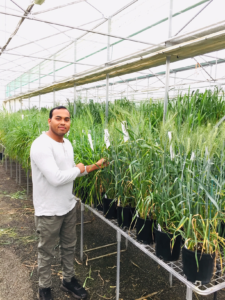
I joined the Australian Society of Plant Scientists (ASPS) as a student member. It offers a golden opportunity to interaction research leaders across the Australasia. I have participated in COMBIO-2018, held at the International Convention Centre, Sydney. I delivered the first talk of my PhD journey at this conference. This conference offered a fantastic opportunity to network with a vibrant scientific community. I was overwhelmed with this positive vibe and registered for ASPS-2019. I acknowledged the ASPS travel grant to present my work at Agri Bio, La Trobe University, Melbourne. Active engagement of participants in the networking program was outstanding. Most of the sessions were targeted to Plant Science community. I truly enjoyed this conference and it would be a great memory of my PhD journey.
Abi Ghifari, School of Molecular Sciences, University of Western Australia
I am Abi Ghifari, a PhD candidate at the School of Molecular Sciences, University of Western Australia. I was grateful to receive the Australian Society of Plant Scientists (ASPS) Travel Award to attend the 2019 ASPS Conference in La Trobe University, Melbourne. Being my first conference ever since I started my PhD journey, I was excited to share a part of my studies to wider community of scientists as well as to hear latest research from fellow graduate students and leading scientists.
In this conference, I presented a poster on one of my research focus about investigating the molecular and biological functions of a new proline aminopeptidase in a model plant, Arabidopsis thaliana. Aminopeptidases are a group of enzymes responsible for recovering single amino acids from short peptides. Therefore, they are essential in the last stage of proteolytic and peptidolytic reactions within cells and the deletion of their functions have implications in plant growth and stress response. During the presentation, I had a lot of insightful discussions with fellow presenters regarding how to improve my experimental design and data analysis and received positive feedback, which encouraged me to further continue my research. By presenting my research in this conference, I had a chance to increase my profile visibility as an aspiring scientist as well as establish a good networking with fellow students and potential future collaborators and employers.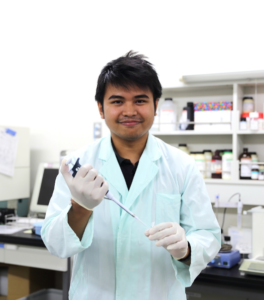
This conference was also a great opportunity to hear latest results from national and international leaders in plant science. Topics and applications were widely ranging, from laboratory bench, greenhouse, and field, yet with the shared ultimate goal of increasing efficiency of plants in tackling various environmental conditions. I was also grateful as in this occasion, my supervisor Dr Monika Murcha was awarded Jan Anderson Award for her consistent research in plant science. Overall, I am deeply grateful for the ASPS to award me a travel grant to attend this wonderful conference.
Tetsuya Ishikawa, PhD Candidate, Tasmanian Institute of Agriculture (TIA), University of Tasmania
ASPS Conference 2019 at La Trobe University was quite meaningful as professional people in the field of plant science in Australia and the world met together to have great discussions. La Trobe University is located in a suburb of Melbourne, and its peaceful atmosphere was quite comfortable and delightful. I appreciate ASPS to provide me Student Travel Grant that was quite helpful to attend this conference. Over the four days of the conference, a lot of aspects in the field of plant science were discussed that developed better understandings and especially will contribute to future food production. This conference also provided us opportunities for networking that widened and strengthened our global community.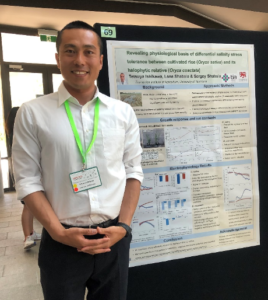
I could communicate my research outcomes as a poster presentation; “Revealing physiological basis of differential salinity stress tolerance between cultivated rice (Oryza sativa) and its halophytic relative (Oryza coarctata)”. Feedbacks from professional researchers and students from other institutions were quite helpful to improve my ongoing research. Widened my networking will contribute to my future career development, especially after I graduate PhD study. I also attended a wildlife sanctuary tour which is organised by ASPS and La Trobe University staff. It was pretty wonderful, and fortunately, we could see a sugar glider that was the most exciting moment. I enjoyed and learned a lot from this conference, and this experience is unforgettable and precious in my career.
Phan Thi Thanh Hoai, University of Adelaide
Greetings! I’m Phan Thi Thanh Hoai, an international student at the University of Adelaide, undertaking my PhD research in the field of plant science. My research is focussed on exploring the roles of aquaporins in seed imbibition and germination. I am supervised by Dr Caitlin Byrt from The Australian National University, and Professor Steve Tyerman and Dr Jiaen Qiu from the University of Adelaide.
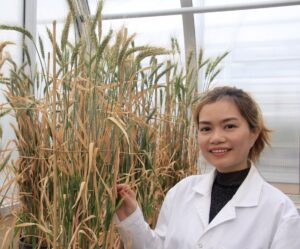
From a very young age, I was always intrigued by abundant colourful flowers and delicious fruits from my hometown in Vietnam. Then questions came into my mind about how plants generate food products, and this inspired me to study plant science. Plant science revealed to me that plants are complicated. Hidden within plants are many biological secrets waiting to be discovered. At the moment, my research is focused on seed imbibition and germination, the very first stages of when plants start their life journeys, and my specific research questions relate to investigating processes influencing water transport during these critical phases of development. Please see the following review to learn more about this topic: Hoai et al., 2020. Deciphering aquaporin regulation and roles in seed biology. Journal of Experimental Botany, 71(6), pp.1763-1773https://doi.org/10.1093/jxb/erz555.
Attending the 2019 Australian Society of Plant Scientists Conference in Melbourne was a great privilege, and I am especially grateful to ASPS for supporting a travel student award so that I could participate and share my research outcomes. The conference was a fantastic opportunity to learn more about the latest advances in plant science and meet other plant scientists in Australia and other countries. I also had a chance to present my results in a presentation and a poster. I received useful feedback from generous and experienced senior scientists and felt more enthusiastic and motivated when I returned home to continue to pursue my research. As a result of participating in the conference, I have established connections with other researchers and beyond, I feel more confident about communicating with the greater scientific community and I’m looking forward to building on the networks I developed to create collaborative opportunities in the future.
Zeenat Rupawalla, Institute for Molecular Bioscience, University of Queensland
I received a travel grant from the Australian Society of Plant Sciences which helped me attend the first time ASPS conference 2019 held in Melbourne – La Trobe University. This provided me the opportunity to meet other plant scientist at different stages of their careers. This conference not only allowed me to present my first year PhD work, but also enabled me to learn from other PhD students and plant scientist. Through this, I was able to develop adequate professional contacts that will aid in my future career development and open opportunities for me after I finish my PhD.
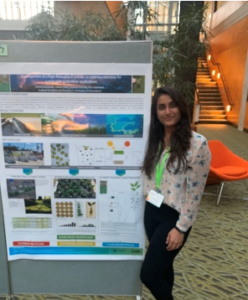
Moreover, presenting my work as a poster helped propagate some interesting conversations which has greatly benefited me to address some potential problems I would face in my project. My project is more inclined towards the commercialisation of biological soil additives using microalgae and cyanobacteria from wastewater systems. This can pave way for circular bioeconomy and contribute to sustainable agriculture in the future to feed a growing population of 9.8 billion people by 2050 (FAO 2016).
Ultimately, it was so inspiring to see other PhD students’ posters as well as their presentations, and to know that we are a part of the future tackling problems in the sustainable agriculture space. I am very grateful for ASPS for giving me the opportunity to present my work at ASPS 2019, and to be a part of the plant science community.
R.N. Robertson Travelling Fellowship, Juan De La Cruz Jimenez Serna, UWA.
In my PhD studies at the University of Western Australia, I have focused on the identification of physiological traits associated with the tolerance of the C4 perennial grasses Urochloa spp to waterlogged acidic soils.
In my studies, we have found that root traits including higher aerenchyma percentage, lower stele area, suberized exodermis, lignified sclerenchyma and a barrier to impede the radial O2 loss are helping to improve plant internal aeration, thus, facilitating the O2 movement from shoots to roots and enabling root growth and nutrient uptake under low-O2 conditions. Moreover, from our studies on root radial O2 loss in response to toxic ions (i.e., Fe+2) and low-O2(deoxygenated agar) treatments, we found out that the development of a barrier to impede radial O2 loss also prevents the entry of toxic ions into the roots.
In several meetings with my supervisor Prof. Tim Colmer, we discussed about the results of my research and the need for measuring root respiration and root cellular O2 concentration in plants growing in low-O2 conditions. These measurements are key for understanding the influence of low-O2 conditions on processes such us root growth and nutrient uptake and would provide important data to understand functioning of roots under limited O2 conditions. Fortunately, Prof. Ole Pedersen from the University of Copenhagen visited our lab in Perth in 2017, we discussed with him our data set and he offered the opportunity for me to visit his lab and do the measurements required.
Thanks to the R.N. Robertson Travelling Fellowship, the Australian Society of Plant Scientists and funds from Prof. Tim Colmer and Prof. Ole Pedersen, I was able to visit Prof. Ole’s Lab, the Freshwater Biological Laboratory of the University of Copenhagen in Denmark. Prof. Ole’s lab is a state of the art laboratory with unparalleled facilities for measuring root tissue O2 status. The lab has O2 microelectrodes, micro-manipulators, respiration chambers and the gas mixers needed to run my experiments.
Before travelling to Denmark, I sent seeds from two genotypes (previously evaluated during my PhD) having contrasting root features. The seeds were planted before I arrived and after establishment, the plants were grown in controlled conditions of light and temperature in pots filled with deoxygenated stagnant medium during three weeks (Fig. 1). 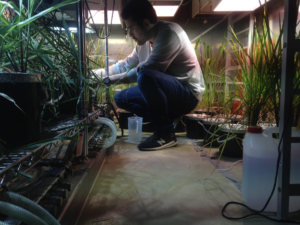
Fig. 1. Plants growing in deoxygenated stagnant conditions under controlled light and temperature.
Individual plants were used for measurements of root tissue O2 status by radial profiling across intact roots (from external medium, across the epidermis and outer tissues, cortex and into the stele). The shoots were sealed off in a chamber and the roots were on stirred water at O2 equilibrium (Fig. 2).
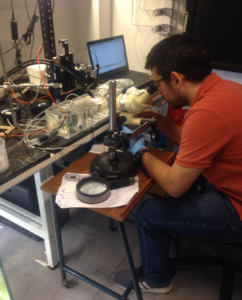
Fig. 2. Experimental set-up. The roots are in stirring water at O2 equilibrium and the shoots are in a chamber with controlled O2 concentration. Microscope is used to position the microelectrode, and O2 profiles are taken by slightly moving the microelectrode using a micromanipulator and a computer system.
The roots were reliant on internal O2 supply via root aerenchyma and the concentration of O2 in shoots was manipulated (21 or 42% O2 concentration) using gas mixers. Moreover, the temperature of the water medium was controlled at 5 or 25 °C.
This research collaboration using an unique set-up has helped us to increase our understanding of tissue O2 status within roots under low-O2 conditions when the external conditions (i.e. O2 concentration and temperature) change. Moreover, in this project we could elucidate some physiological aspects of root aeration under low-O2 conditions. In fact, measurements of O2 profiling have been merely done in wetland plans, thus, this work reinforces the understanding of O2dynamics in C4 grasses. This knowledge adds invaluable significance to my previous findings and adds important data for my PhD thesis.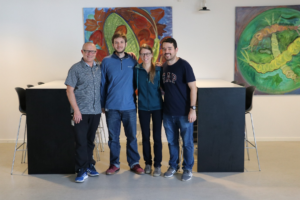
Fig. 3. From left to right. Prof Ole Pedersen, PhD student Lucas Ogorek, Dr. Elisa Pellegrini and myself.
This project has been very educational for me, having worked side by side with Prof. Ole (an expert and top scientist on responses of plants to low-O2 conditions) and his team (Fig. 3) has contributed to improve my knowledge on O2 transport in plants and my skills in the use of eco-physiology equipment. I am very grateful to the R.N. Robertson Travelling Fellowship, the Australian Society of Plant Scientists, the University of Western Australia, Prof. Tim Colmer and Prof. Ole Pedersen for funding my project. I would also like to thank Lucas, Elisa, Raheb, Ayoe, Ann and many others at the University of Copenhagen that made my stay in Denmark pleasant and productive.
Events for your calendar:
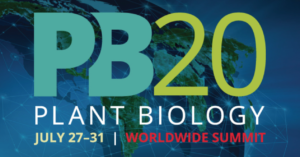 |
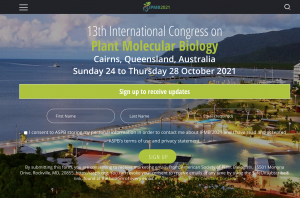 |
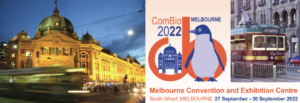 |
You can email us at the communications website if you have upcoming events to promote, virtual and face-to-face. Please also send us any enlightening stories to share.
Tweet to us: @asps_ozplants and Facebook
